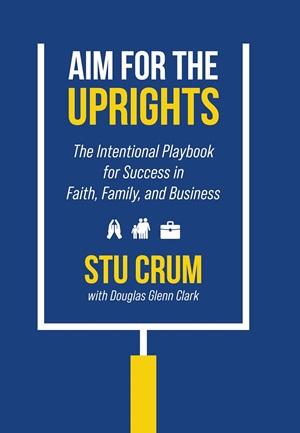Stu Crum, with Douglas Glenn Clark, has released the new book Aim for the Uprights: The Intentional Playbook for Success in Faith, Family, and Business. As the title suggests, the book is something of a business and leadership advice guide, with a touch of the decidedly personal memoir to boot. Crum is able to balance multiple tonalities with considerable verve, making the book have a potential for wide appeal. He breaks down core tenets for how to, as the title indicates, aim for uprights – in effect, for having it all. It all comes down to practical applications of several different incentives.
Crum is able to provide anecdotes from his own life, transitioning from a student athlete into a successful business leader. “As my student-athlete career ended at the University of Tulsa, my chances of being drafted by the National Football League (NFL) were very good. In my senior year I was ranked third in the nation for field goals, and I played in the Senior Bowl, which in those days was a gateway to professional football. It was the first time my teammates and I got paid to play,” he writes. “Although I am blessed to have many memorable moments at Tulsa, my goal of turning pro was enhanced in my final year when I kicked four field goals—my best was 57 yards—to beat Oklahoma State, 25–15, in a nationally televised game. I was selected Chevrolet Player of the Game. Good fortune, to be sure. But lucky?… Some observers might say that my student-athlete and professional sports career provided special training that has allowed me to excel a businessman, husband, father, and Christian man of faith. Therefore, they conclude, this focus will not work for people shared by other experiences. I disagree.”
AMAZON: https://www.amazon.com/Aim-Uprights-Stu-Crum/dp/096012490X
Crum is also able to draw apt parallels between decision-making with respect to his student-athlete career, and to working in the corporate world. In many ways, both are games, and as he brilliantly points out games require a degree of both professional and interpersonal, contextual expertise.
“When I played junior varsity football, I was the placekicker. At the start of one game, as I trotted on field to prepare for the kickoff, I noticed the coach from the opposing team sizing me up. Then my ears tingled when I heard him advise his players to move closer. He had assumed that a short player couldn’t kick a long ball,” he writes. “…In a sense, I used that same method, my burning ears, to develop my vision for the future of Bridgestone. I didn’t sit alone in my office and think stuff up. I let other voices and minds fill my cup.
A casual remark, a presumptuous boast, and even some grousing—lots of grousing, actually—could illuminate the playing field. During my visits with six regional vice presidents, it quickly became clear that each person had a separate way of running the business. They shared the same point-of-sale system, of course, so if you went to a Firestone store or a Tires Plus to make a purchase, the front end was the same. But the way each VP chose leaders, or managed operations or procured parts, for instance, was a little different.”
Cyrus Rhodes



























